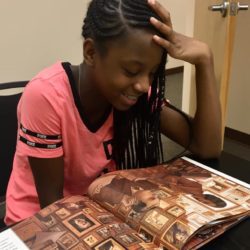When I tutor, some of my students’ questions and thoughts genuinely surprise me. At ages as young as four-years-old, they wonder about money, politics, religion, and culture. One student, barely taller than the table we worked at, looked at me with sad eyes and said unprompted, “I don’t like my skin.” She explained that no one else in her family was as brown as her, and I could see how deflated she felt. We spent the rest of the lesson talking about her beauty and the prejudice of colorism. I talked with her mother after the session. “Yes,” she said with a deep sigh. “We’ve been having a lot of conversations lately. I don’t feel ready.”
As a parent and an educator, I know that feeling of being caught off-guard. On many occasions, my children have approached me with questions whose answers I could only fumble through. But there were some difficult conversations that I knew I wanted to address with my children early on. I wanted to talk to them about their heritage as multigenerational Black Americans. I wanted to tell them about slavery and equity. Even though my language when talking to my children about American history was simplified, I didn’t want to be indirect.
I remember my own elementary education and how textbooks erased so much of American history. And while I understand the desire to keep children shielded from the negativity of life, honest and open conversations about race, prejudice, and anything else do not have to be gruesome or scarring. Especially during the holiday season when discussions about the violence of colonization and indigenous people’s suffering is reduced to pictures of headdresses and pilgrim hats, it’s important to speak with our children directly. We can tell them that people have been hurt and continue to be hurt because of prejudice. That showing compassion and kindness toward other people doesn’t just mean pretending not to see different skin tones. We should tell them how for generations, people haven’t received the fair treatment they deserve.
Children are capable of hearing conflict and having difficult discussions. They hear them everyday in their TV shows, at school, and at home. I can’t say the right time to talk to children about these challenging topics because parents and guardians know their children best, but I do know that children, like adults, can learn and grow from speaking openly. I know that they think about prejudice before they sometimes have the language to express it, and I hope that as adults, we can help guide them through these bumps even when we’re still uncertain ourselves.
By Shawn R. Jones

